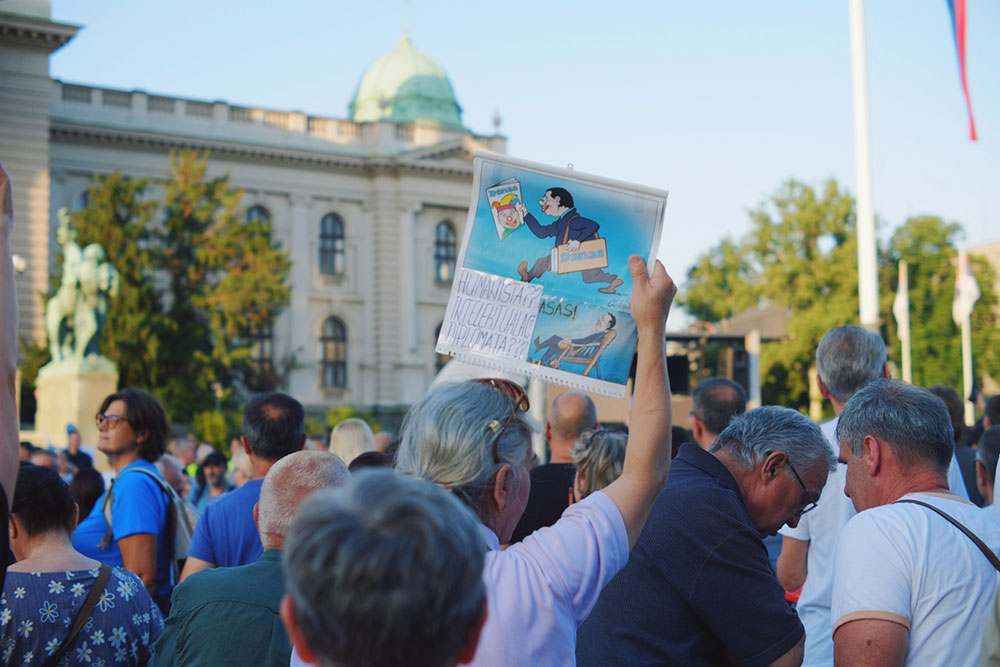
I would not talk to Vucic again, says Djilas. Adding: we had an agreement and Vucic broke it. The agreement was, as you may remember, that by the end of last year a new local election would be announced and held in Belgrade. Not only did this not happen, but it is unlikely it will happen this year, or even the next. The Belgrade election won’t happen in due course, and neither will the parliamentary election announced for September. All that was pushed to 2024. Vucic said so. And Djilas now knows – Vucic cannot and should not be trusted.
Vucic pre-emptively lost the potential September election back on May 26, when he showed everyone (even though no one asked him to) that he could no longer bring a sufficient number of his (involuntary) supporters to the streets. On May 26, there were significantly fewer of them than on some previous (counter)occasions. There will be no election in September because Vucic cannot win it. It’s that simple. And he will never win another election in Belgrade again. If there is still opposition in Serbia. Which we can’t rely on. Serbia is paralyzed between two weaknesses: Vucic cannot win an election; the opposition cannot force him to hold one.
Regular elections represent the way out. Until then, Vucic will try to deepen existing crises and create new ones. And what will the opposition do? The conflict in the People’s Party is a hint. It’s good that that bad story didn’t stay in the public eye for long. But it’s bad we even saw it, no matter how briefly. In terms of its politics, this party stands out conspicuously among other parties that have taken it upon themselves to organize protests against violence. With Aleksic at its head, those differences would be significantly reduced. It is up to them now to choose where and how to proceed.
As for the other parties in the protest, it should have become clear to them by now – they must go to the elections together, as one list. The list can be called “Against Violence” or whatever they think is best, but it must be united. The reason is simple, it is the only way to transfer the momentum of the protests into the political field and the elections themselves. The protests as a whole are far more visible than any individual party involved with their organization. For the first time, their differences in these protests do not work against their joint appearance in public. The only way for Vucic to have a chance in the elections (especially in Belgrade) is to split the opposition which is now united in the protest.
It wouldn’t surprise me if Aleksic, unlike Jeremic, understood that. Jeremic would still want to overthrow Vucic on the issue of Kosovo, that is, in a referendum on an agreement that has long since ceased to exist, if it ever did. That pushes Jeremic towards DSS, Dveri and others in the right wing of the opposition. If the People’s Party needs to split so that one part of it, headed by Jeremic, would embrace Jovanovic and Obradovic, and the other, headed by Aleksic, would go towards the SSP, DS, PSG, the Green-Left Front… – well, let it split, the sooner the better. Although it would be best if that did not happen and the People’s Party remained as it is now, with Aleksic at the head, of course.
The impression is that Djilas also publicly promised that he would never talk with Vucic again in order to further strengthen the still fragile electoral coalition in the making. Others from the protest bloc could not forgive him for going to Vucic’s party after the Belgrade elections. There was no reason for Djilas to explain anything about that notorious encounter to anyone, and yet he did. It was almost as if he publicly apologized and promised that he would stick to the agreement in the future and not play his own game. This is all speculation, of course. But I can’t imagine a better interpretation than this.
When we draw the line, here’s what we’re left with – an election in just over half a year; a potentially strong opposition coalition with good electoral chances; unchangeably abysmal state of the media; a regime that will try more than ever to steal the election.
This means that the democratic opposition bloc would have to stay together for at least the next six months, and more, because there is still a long way to go before the regular election in Belgrade. It will not be easy, especially since they have to count on the insidious blows of the regime. The opposition should seek space in the (regime) media, but they will not get it. That battle should be fought with half strength. It has been shown that protests (against violence) give greater visibility to the opposition than could be obtained by appearances in (hostile) media. The opposition must be able to control the election. Although they claimed that they were already able to do this in the last Belgrade election, that turned out not to be the case.
There is no conclusion. Quite simply, we will have to wait and see if the opposition is smart and strong enough to meet these conditions.
Translated by Marijana Simic
Peščanik.net, 28.08.2023.
- Biografija
- Latest Posts
Latest posts by Dejan Ilić (see all)
- Dođeš mi, dođem ti - 26/04/2024
- Greška bi nas spasila - 23/04/2024
- Everyone keeps talking about Banjska - 20/04/2024


